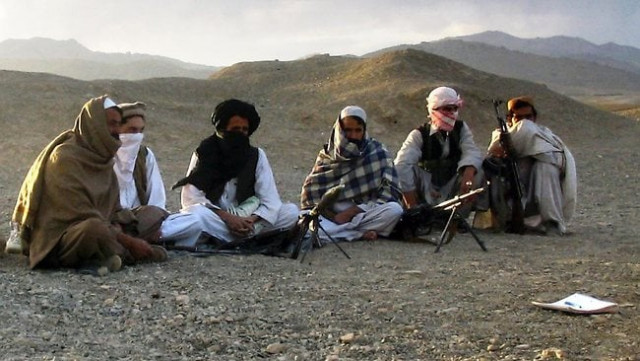Taliban not averse to talks but ‘in no hurry’ either
Call upon Kabul to stop propaganda and create conducive atmosphere

Afghan Taliban. PHOTO: AFP
However, Taliban leaders say they are not “averse to peace or political process” – but those at the helm of affairs in Kabul must “create a conducive atmosphere and stop poisonous propaganda linking us with Pakistan”.
Reconciliation with Taliban: Afghan opposition leader opposes Pakistan’s role
Like other countries, Islamabad can be a facilitator but not a decision-maker, two Taliban leaders said while speaking exclusively to The Express Tribune. “There should be a difference between facilitator and decision-maker. The decision could only be taken by the Afghans, not by any other country,” one Taliban leader said requesting not to be identified by name.
He also recalled the propaganda launched by the Kabul administration after the first-ever face-to-face meeting between Afghan officials and Taliban representatives in July suggesting that Islamabad was pulling the strings of the Taliban. “We have our suspicions about the intentions of the Afghan authorities as they used the informal meeting in Murree to leak the news of death of Maulvi Sahib [Mullah Omar],” he said.
Many believe that the Afghan intelligence agency, the National Directorate of Security, had leaked the news of Mullah Omar’s death a day before the second round of talks under the Murree Peace Process to sabotage the nascent initiative.
Asked about the renewed push for peace, the Taliban negotiator said the quadrilateral initiative by Afghanistan, Pakistan, China and the US, and Pakistan Army chief’s visits to Washington and Kabul were related to Afghanistan but the “problem is that the Kabul administration has not unveiled any strategy for a political process”.
“We want the Kabul administration first stop propaganda, create a favourable atmosphere if it seriously wants to pursue talks, and then address our conditions that include a clear decision if the invading troops have any plan to withdraw from Afghanistan,” he said.
“If [President] Ashraf Ghani says his administration will not talk about whatever Kabul has done in 14 years, then why they want to have peace talks with us. Such rhetoric amounts to surrender and is against the spirit of reconciliation.”
Another Taliban leader sought to dispel the impression that the group was under some pressure to join the peace process. “No one can put pressure on Taliban leaders and mujahideen. No pressure on the Islamic Emirate will work,” he said speaking off the record with The Express Tribune.
Taliban deny talks with Russia on Islamic State in Afghanistan
The two Taliban leaders angrily dismissed “rumours of schisms within the Taliban’. “This is just an excuse to mislead the people of Afghanistan,” one leader said.
The rulers are ‘deeply divided’ over the peace process as leaders like Uzbek warlord Abdul Rashid Dostum, first vice president, and Ahmad Wali Masoud are publicly opposing peace dialogue describing it as a waste of time, he said. “How talks could start when the Kabul administration has no consensus.”
Published in The Express Tribune, December 28th, 2015.



















COMMENTS
Comments are moderated and generally will be posted if they are on-topic and not abusive.
For more information, please see our Comments FAQ